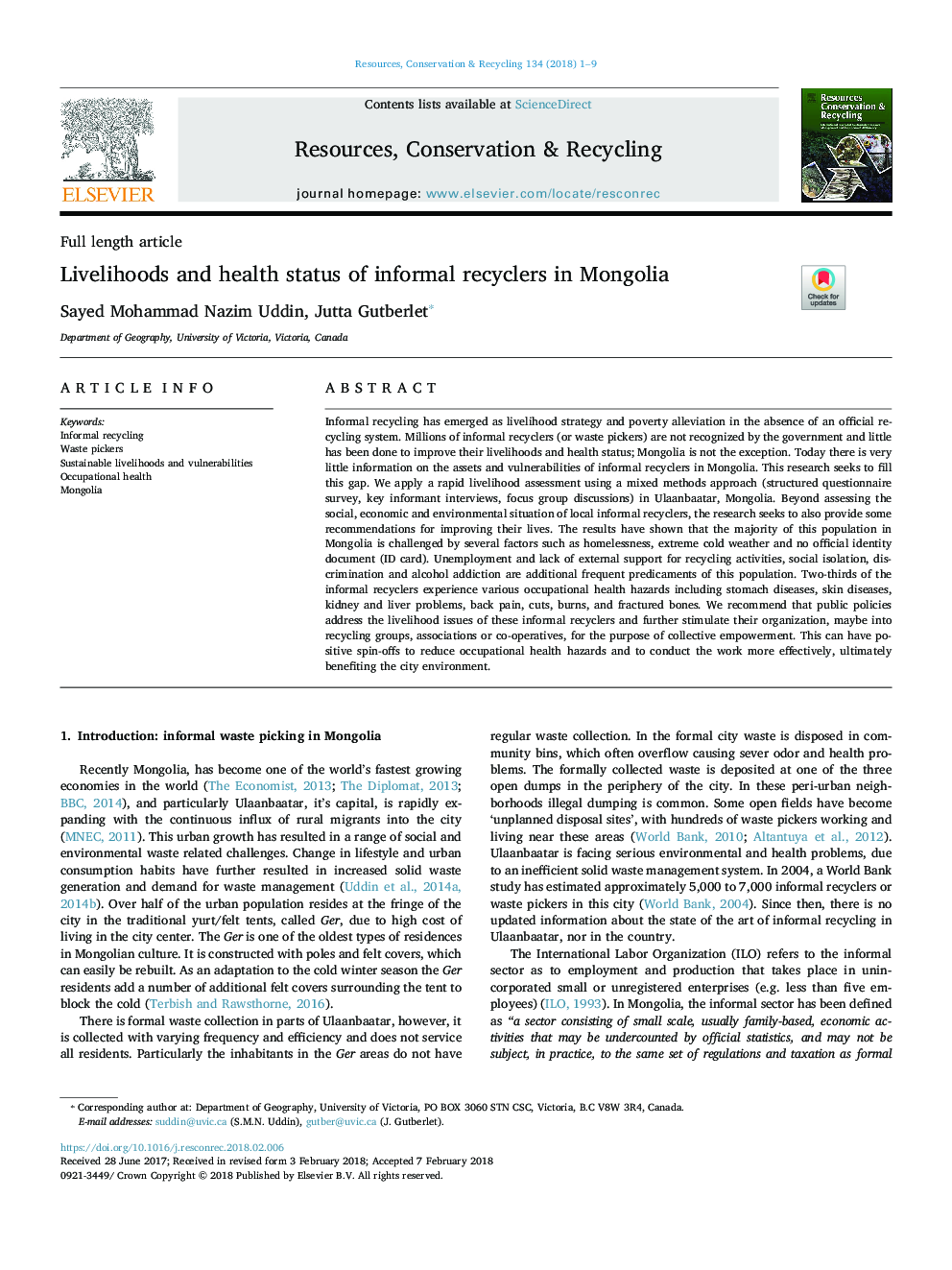| کد مقاله | کد نشریه | سال انتشار | مقاله انگلیسی | نسخه تمام متن |
|---|---|---|---|---|
| 7494107 | 1485658 | 2018 | 9 صفحه PDF | دانلود رایگان |
عنوان انگلیسی مقاله ISI
Livelihoods and health status of informal recyclers in Mongolia
ترجمه فارسی عنوان
معیشت و وضعیت سلامت بازرسان غیر رسمی در مغولستان
دانلود مقاله + سفارش ترجمه
دانلود مقاله ISI انگلیسی
رایگان برای ایرانیان
کلمات کلیدی
بازیافت غیر رسمی، جمع کننده های زباله، معیشت و ضعف های پایدار، سلامت شغلی، مغولستان،
ترجمه چکیده
بازیافت غیر رسمی به عنوان راهبرد معیشت و کاهش فقر در نبود یک سیستم بازیافت رسمی ظاهر شد. میلیون ها نفر از بازرسان غیر رسمی (یا جمع کننده های ضایعات) توسط دولت به رسمیت شناخته نشده اند و به منظور بهبود معیشت و وضعیت سلامت آنان، انجام شده اند. مغولستان استثنا نیست امروز اطلاعات بسیار کمی در مورد دارایی ها و آسیب پذیری های سازندگان غیر رسمی در مغولستان وجود دارد. این تحقیق به دنبال پر کردن این شکاف است. ما از ارزیابی سریع معیشت با استفاده از رویکرد ترکیبی (نظرسنجی ساختار یافته، مصاحبه های کلیدی خبرنگار، بحث های گروه های متمرکز) در اوگان بوتار مغولستان استفاده می کنیم. این تحقیق فراتر از ارزیابی وضعیت اجتماعی، اقتصادی و محیطی بازرسان غیررسمی محلی، به دنبال ارائه توصیه هایی برای بهبود زندگی آنها است. نتایج نشان می دهد که اکثریت این جمعیت در مغولستان با عوامل متعددی مانند بی خانمانی، آب و هوای سرد و بدون هویت رسمی (کارت شناسایی) به چالش کشیده شده است. بیکاری و فقدان حمایت خارجی برای فعالیت های بازیافت، انزوای اجتماعی، تبعیض و اعتیاد به الکل، مشکالت مکرر این جمعیت است. دو سوم از بازآموزندگان غیر رسمی انواع خطرات بهداشت حرفه ای شامل بیماری های معده، بیماری های پوستی، مشکلات کلیه و کبدی، درد پشت، برش، سوختگی و استخوان های شکسته را تجربه می کنند. ما توصیه می کنیم که سیاست های عمومی به مسائل معیشتی این بازآموزان غیر رسمی توجه کنند و به منظور توانمند سازی جمعی، سازمان خود را، شاید به گروه های بازیافت، انجمن ها یا همکاری ها، تحریک کنند. این می تواند برای کاهش خطرات بهداشت حرفه ای و کارآمدی کارآمدتر، در نهایت از محیط زیست شهر بهره مند شود.
موضوعات مرتبط
مهندسی و علوم پایه
مهندسی انرژی
انرژی های تجدید پذیر، توسعه پایدار و محیط زیست
چکیده انگلیسی
Informal recycling has emerged as livelihood strategy and poverty alleviation in the absence of an official recycling system. Millions of informal recyclers (or waste pickers) are not recognized by the government and little has been done to improve their livelihoods and health status; Mongolia is not the exception. Today there is very little information on the assets and vulnerabilities of informal recyclers in Mongolia. This research seeks to fill this gap. We apply a rapid livelihood assessment using a mixed methods approach (structured questionnaire survey, key informant interviews, focus group discussions) in Ulaanbaatar, Mongolia. Beyond assessing the social, economic and environmental situation of local informal recyclers, the research seeks to also provide some recommendations for improving their lives. The results have shown that the majority of this population in Mongolia is challenged by several factors such as homelessness, extreme cold weather and no official identity document (ID card). Unemployment and lack of external support for recycling activities, social isolation, discrimination and alcohol addiction are additional frequent predicaments of this population. Two-thirds of the informal recyclers experience various occupational health hazards including stomach diseases, skin diseases, kidney and liver problems, back pain, cuts, burns, and fractured bones. We recommend that public policies address the livelihood issues of these informal recyclers and further stimulate their organization, maybe into recycling groups, associations or co-operatives, for the purpose of collective empowerment. This can have positive spin-offs to reduce occupational health hazards and to conduct the work more effectively, ultimately benefiting the city environment.
ناشر
Database: Elsevier - ScienceDirect (ساینس دایرکت)
Journal: Resources, Conservation and Recycling - Volume 134, July 2018, Pages 1-9
Journal: Resources, Conservation and Recycling - Volume 134, July 2018, Pages 1-9
نویسندگان
Sayed Mohammad Nazim Uddin, Jutta Gutberlet,
